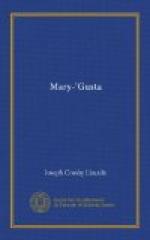And meanwhile the child herself was vaguely, and in childish fashion, wondering that very thing. She was in the carriage room of the barn belonging to the Hall estate—if the few acres of land and the buildings owned by the late Marcellus may be called an estate—curled up on the back seat of the old surrey which had been used so little since the death of her mother, Augusta Hall, four years before. The surrey was shrouded from top to floor with a dust cover of unbleached muslin through which the sunshine from the carriage room windows filtered in a mysterious, softened twilight. The covered surrey was a favorite retreat of Mary-’Gusta’s. She had discovered it herself—which made it doubly alluring, of course—and she seldom invited her juvenile friends to share its curtained privacy with her. It was her playhouse, her tent, and her enchanted castle, much too sacred to be made common property. Here she came on rainy Saturdays and on many days not rainy when other children, those possessing brothers or sisters, played out of doors. She liked to play by herself, to invent plays all her own, and these other children—“normal children,” their parents called them—were much too likely to laugh instead of solemnly making believe as she did. Mary-’Gusta was not a normal child; she was “that queer Lathrop young-one”—had heard herself so described more than once. She did not like the phrase; “queer” was not so bad—perhaps she was queer—but she had an instinctive repugnance to being called a young-one. Birds and rabbits had young-ones and she was neither feathered nor furred.
So very few of the neighborhood children were invited to the shaded interior of the old surrey. Her dolls—all five of them—spent a good deal of time there and David, the tortoise-shell cat, came often, usually under compulsion. When David had kittens, which interesting domestic event took place pretty frequently, he—or she—positively refused to be an occupant of that surrey, growling and scratching in a decidedly ungentlemanly—or unladylike—manner. Twice Mary-’Gusta had attempted to make David more complacent by bringing the kittens also to the surrey, but their parent had promptly and consecutively seized them by the scruff of their necks and laboriously lugged them up to the haymow again.




